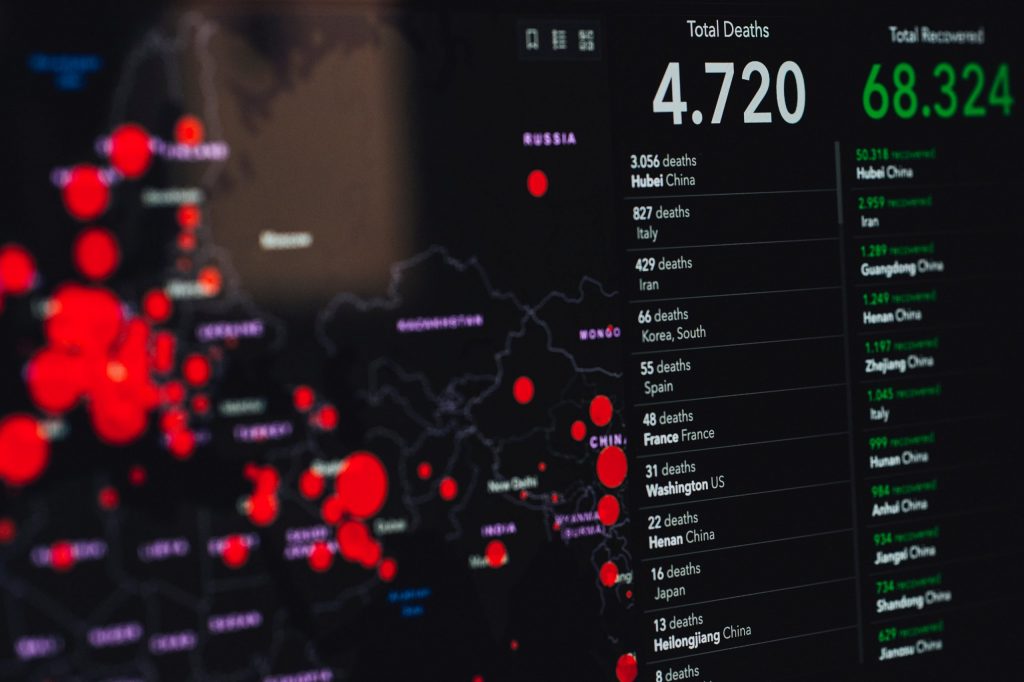As you contemplate the next step in your career – whether you’ve already decided to pursue grad school, are still unsure about continuing your education, or have made the jump right into the workforce following post-secondary education – a question that’s likely crossed your mind is this: Can I land a job in public health without a Master’s degree?
It’s a question that’s been on our mind for some time now because we get asked it over and over again by our community members.
In preparation for this article, we also posed the question to our community on social media, namely LinkedIn and Instagram, to collect feedback. Before we share the findings and our thoughts breaking this down, here’s our basic standpoint: It certainly is possible to work in public health without a master’s level degree. Having said this, a Master’s level degree does however provide you with options: opportunities to negotiate a higher salary or consideration for senior roles. Furthermore, overall job prospects may in fact be better for those with a Master’s level education.
This article will discuss this standpoint further, focusing on these key points:
- There exists public health jobs where the minimum requirement is an undergraduate-level degree.
- Once you are hired into an organization (without a Master’s level degree), you may be better positioned to navigate the expectations for a Master’s level degree; however, it may be difficult to move into senior roles if such roles are mandated by unions and/or organizational policies.
- For those jobs that list a Master’s level degree as a requirement, you can still throw your hat in! Despite not having a Master’s level degree, you may still be able to land an interview if you can thoughtfully craft your cover letter and resume to tell a story that aligns your skills and experiences to the job description. When you are telling this story, emphasize your existing skills and experiences rather than the Master’s level degree that you don’t have.
Let’s get into these points, starting with what our community shared with us.
The Public Health Career Club
Wanna join the #1 hangout spot and community dedicated to building and growing your dream public health career?
What has been the experience of the PH SPOT community?
Based on a LinkedIn poll we administered, similar to our standpoint, the majority of participants (84%) felt that it was possible to work in public health without a Master’s level degree.
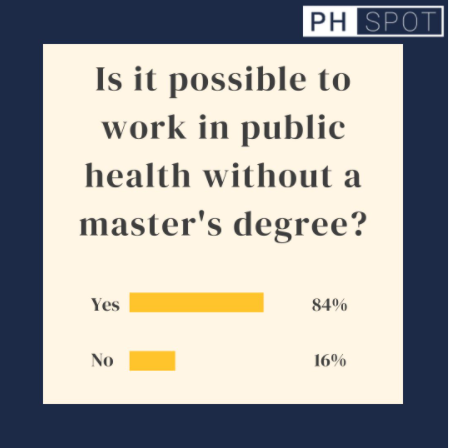
We heard personal stories shared on Instagram – a few are shared below (punctuations, capitalization, and minor edits done by us).
In support of having found a job without a Master’s-level degree:
“I worked in decision support, Ministry and funder reporting, and health informatics for a community health centre while working on an MPH” -@epi.report
“Yes – I’m a health educator at my local DOH. However, I make $18/hr with no PTO/sick leave and can’t get a raise because I would be making more than other employees with MPHs. Biggest benefit of MPH is being able to negotiate a higher pay.” -@laaaaauuuurrraa
“I was a community health educator (sex educator) for various nonprofits without an MPH.” -@s.m.k__
Challenges with finding employment without a Master’s level degree:
“I completely think it depends where you are. Where I live, there are a lot of people with MPHs so it’s difficult to secure a traditional public health role without one.” -@mzericao
This comment on our LinkedIn discussion provides further data on this topic:
“In the United States, our study of employment outcomes of 53,400 public health graduates found that master’s graduates have higher employment levels. Bachelor’s graduates were more likely to find jobs in for-profit corporations including many unrelated to health. Also, what is the definition of public health? If it’s traditional, government health departments, then only 19% of all public health graduates and only 10% of bachelors graduates found employment in that sector. So, sure, it is possible for bachelor’s grads to find jobs in public health. But employment options are likely to be better with more training. This could also change, since here in the USA there are major investments in government public health so more jobs will be available for people with all backgrounds. [A] …study in Australia had similar findings.” -Heather K.
Next, let’s look at what jobs exist where the essential educational qualification does not include a Master’s level degree.
What are some public health jobs that don’t require a master’s degree?
There are many public health roles that do not require a Master’s level degree. Traditional public health roles such as a Public Health Educator, Health Promoter, Public Health Inspector and Public Health Data Analyst would fall into this category.
In the spirit of “show, don’t tell”, we went ahead and searched for a few of these roles (search made on November 28, 2021) and their respective qualifications to illustrate this:
Public Health Educator
Organization: St. Louis County, Department of Public Health and Human Services
Essential Educational Qualification: Undergraduate (Bachelor’s) degree
Compensation: $25.21 – $34.94 / Hour
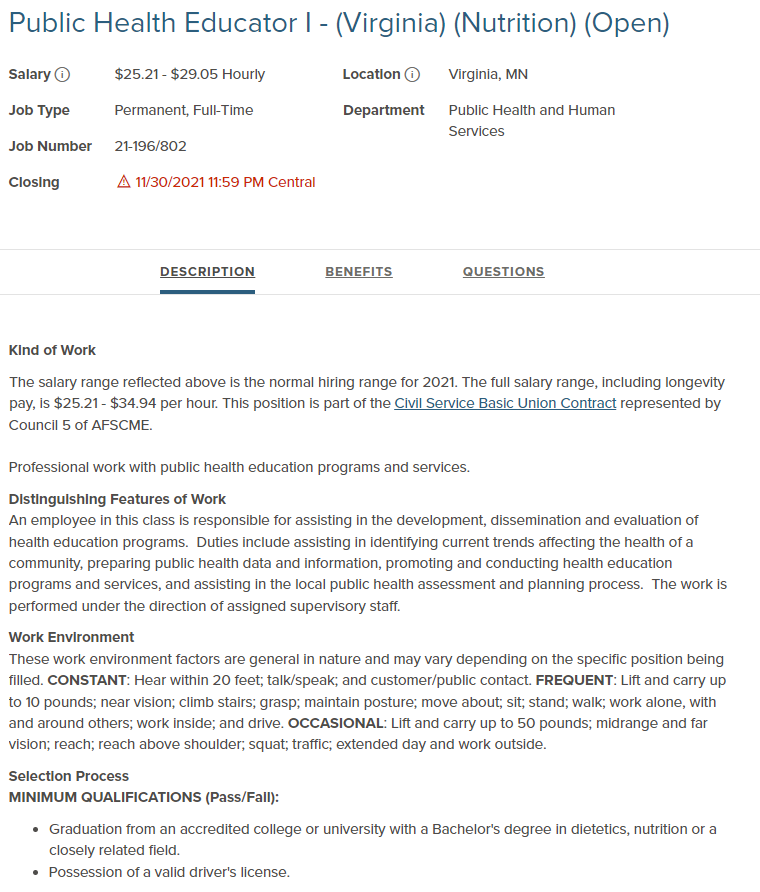
Certified Public Health Inspector)
Organization: Regional Municipality of York (Ontario, Canada)
Essential Educational Qualification: University Degree (level not specified)
Compensation: $44.17 to $48.01/ Hour
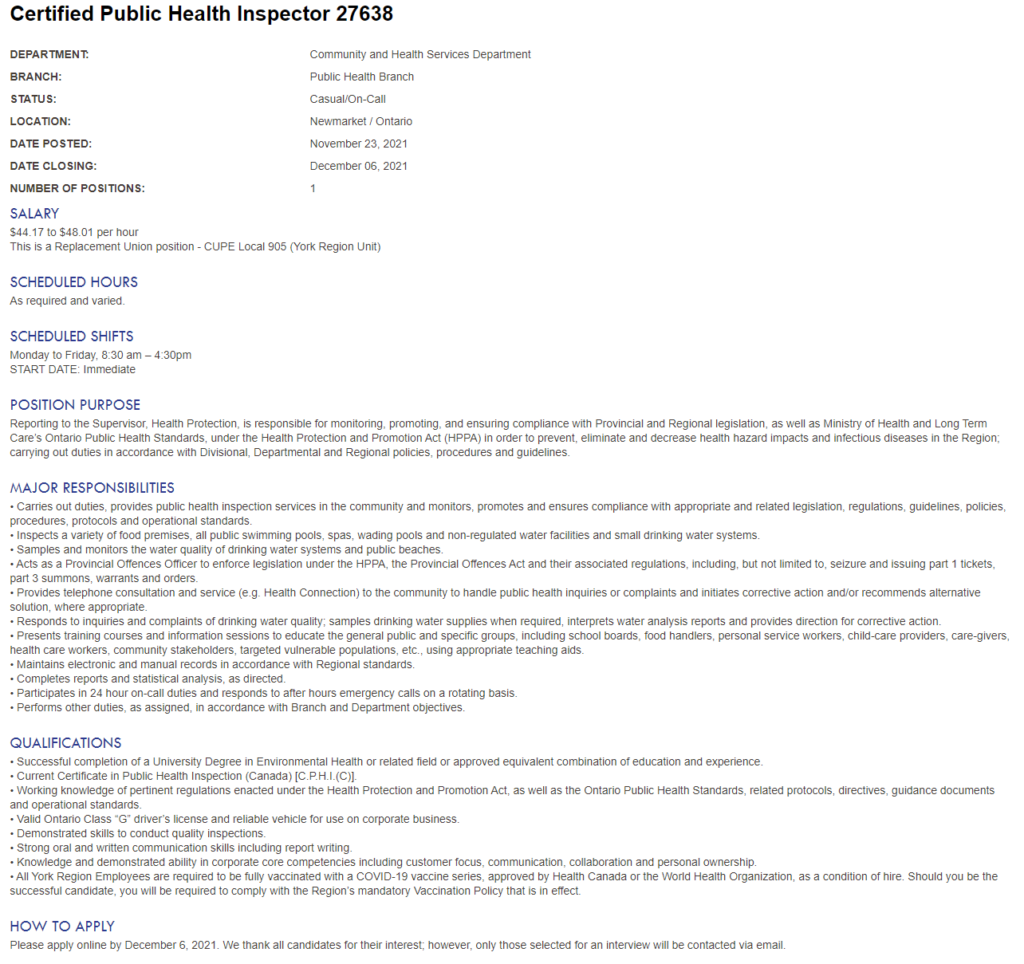
Pandemic (COVID) Forecast Team Lead
Organization: Scarsin Corporation
Essential Educational Qualification: Undergraduate Degree
Compensation: Unknown
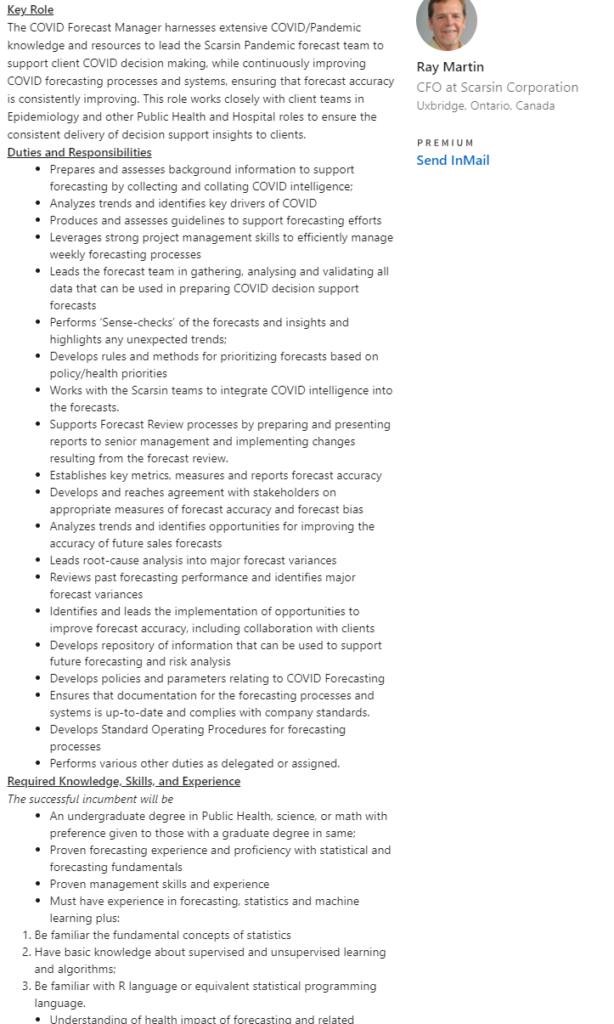
While these jobs specifically ask for an undergraduate level education and do not mention anything about a Master’s level degree, you will come across jobs where the essential qualification is an undergraduate degree, and a Master’s level education as an asset. Here’s what we mean:
Project Coordinator
Organization: Boston University, School of Public Health, Epidemiology
Educational Qualification: Bachelors’s degree is required. Masters degree preferred.
Compensation: Unknown
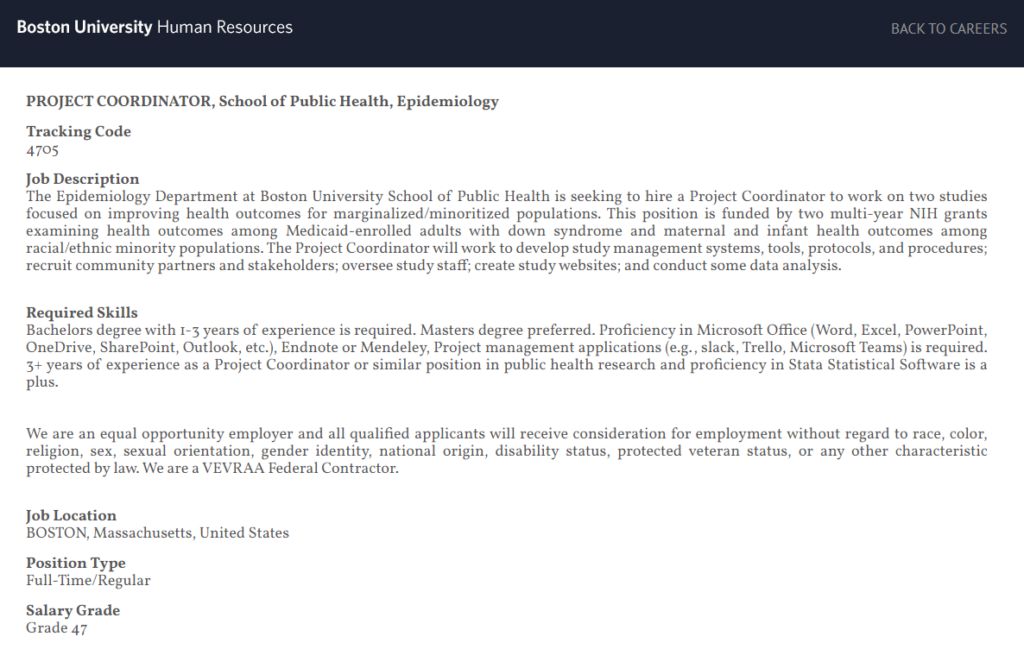
For these job postings, our advice to those without a Master’s level degree would be to indeed apply! More about how to position yourself for the role will be shared later in the article.
Is a public health Master’s degree worth it?
After reviewing some of these postings, and reading the comments shared by your peers, your next question is something along the lines of:
Is a public health Master’s degree really worth it? The job postings show me that I don’t necessarily need it, but the stats tell me (and people’s experiences) that it is helpful to have additional training. What would additional training give me?
Public Health is “the art and science of preventing disease, prolonging life and promoting health through the organized efforts of society” (Acheson, 1988; WHO). While medicine focuses on treating illnesses, public health is focused on preventing illnesses in populations by protecting their health and improving it.
Public health is a diverse field. A mix of skills and passion contribute to the diversity we find in the workforce. Each individual’s unique skill and reason for studying public health add to this diversity.
Historically, public health training occurred at the graduate level, however more recently, undergraduate programs have been established. In the US for example, “a total of 75,165 undergraduate public health degrees from 271 institutions were conferred during 2003-2016, increasing from 1,448 in 2003 to 12,895 in 2016. More than half of the undergraduate public health degrees were conferred from 2011 through 2016” (Resnick B, Leider JP, Riegelman R., 2018). (This study also discusses post-undergraduate employment at 75% between 2014-2015.)
While public health professionals are trained in the field at the undergraduate level (to establish foundational skills), others receive more specific training in public health at the Master’s level.
A Master’s level education is ideal for those “looking to enhance their expertise” (Dalla Lana School of Public Health), “gain the intellectual foundation and specialized skills” (Harvard Chan School), and/or “develop…leadership potential” (Lakehead University).
A Master’s degree in public health can either be a Master of Public Health (MPH) degree or a Master of Science Degree (MSc). While the MPH is often course-based (with some offering a thesis component), the MSc is a research-based degree. Depending on the institution, you can pursue a generic MPH degree, or choose a specilization/concentration. An MSc degree almost always requires a specialization, such as Epidemiology, Biostatistics, or Addictions and Mental Health, for example.
Most Master’s level public health programs take up to 2 years to complete, while some can be completed within one year. This holds true for programs in Canada, the United States, as well as online ones.
If you plan on pursuing a Master’s level degree, check out these two resources: What I wish I knew series What I wish I knew before I started my Master of Public Health (MPH) degree What I wish I knew during my Master of Public Health (MPH) program What I wish I knew right after I graduated from my Master of Public Health (MPH) program MPH degree starter guide The PH SPOT essential guide to deciding whether an MPH is right for you and choosing the right program & school that best fits your needs
While we believe that you absolutely can start your career in public health without a Master’s level degree, moving up to more senior-level roles at some organizations may be difficult. This could in part be due to regulations/policies set forth at the organization (e.g., by unions, job classifications), the role truly requires specialized training, or the majority of applicants in the pool have a Master’s level training, thereby making it a competitive process. Nonetheless, once you are a part of an organization, you will be able to better navigate the need for a Master’s degree and discuss options with your HR department and/or management.
This brings us to our final and most important point: I know I can do this job (but the posting says I need a Master’s degree).
How do I apply to a job in public health with no Master’s degree?
We bet this has happened to you.
You come across a job posting. You read the description, about the role and the responsibilities, and begin to get this strong feeling that you can do the job and fit the role well.
But as you scroll down to the requirements/qualifications section, you get discouraged because the role requires a certain number of years of experience or a higher level of education.
What do you do?
Close the page down?
Or apply anyways?
We hope you will apply. And here’s why.
HR professionals and career coaches will tell you that job requirements listed on job postings are a wish list that employers put together for their ideal candidate. The well-written postings will actually separate out the essential qualifications from the “nice to haves” (asset or preferred qualifications). As we all know, this is not always the case!
Consider job postings (i.e. the list of required qualifications) as a guideline. If you feel as if you meet most of the qualifications and trust that you are a good fit for the role, put yourself out there and apply. The goal is to land an interview so that you can explain further why you would be a great fit, to let your personality shine, and express your enthusiasm and passion for the role! If you don’t put yourself out there, you won’t have a fighting chance.
However, a generic application (resume and covers letter) won’t work here. Preparing your application in a way to showcase why you are an ideal candidate is important. This includes aligning your skills and experiences with the job description through your resume and cover letter, and further at your interview.
To do this, thoughtfully craft your story for the employer, by including your why, your passion for the field, motivation to apply to the specific job, and how you are the best person to do the job. Your application should put more weight on the skills and experiences you already have rather than the qualifications you don’t have (i.e. Master’s level degree), and highlight transferable skills to fill in any gaps. The key is to review the job posting carefully, and aim to craft your resume using similar language found in the posting.
Here’s an example:
Epidemiologist, Chickahominy Health District
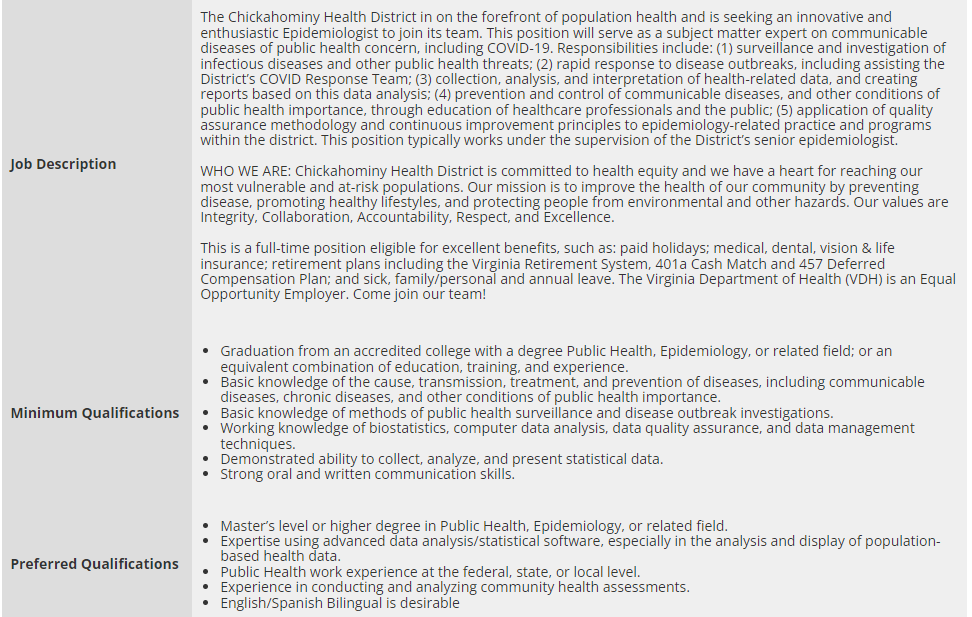
- Minimum Requirement: Demonstrated ability to collect, analyze, and present statistical data.
Your story: You worked on a semester-long project during your undergraduate studies in a professor’s lab looking at COVID-19 case data in the country. Your responsibilities included cleaning the data, finding trends, and contributing to a weekly report that your supervisor presented to a committee.
On your resume: Include keywords from the job description to explain how you meet the requirement.- Collected, cleaned and organized COVID-19 case and death data in Canada from multiple sources including government websites and media reports.
- Performed weekly statistical analysis using R to identify trends, by date, region, and case outcomes, and summarized findings and presented them in a weekly report.
- Preferred qualification: Master’s level or higher degree in Public Health, Epidemiology, or related field.
Your story: You only have an undergraduate degree in health studies, but have relevant courses, in addition to some work experience.
On your resume: Beef up the education section. Add relevant courses in Epidemiology.
HONOURS BACHELOR OF SCIENCE (HBSc), Major: Health Studies
Relevant Courses:
– Foundations in Epidemiology
– Analytical Epidemiology
– Community Health and Epidemiology
– Statistics & Epidemiology 1
– Statistics & Epidemiology 2
On your cover letter: Speak about projects and assignments completed in these courses and tie them back to the job description. Highlight all analytical work you have completed. - Tip: Additionally, don’t just stick to “work experiences” when crafting your story.
- Dig deep into everything you’ve ever done.
- This includes volunteer roles, assignments, projects and presentations done during your courses, articles you have written for blogs, YouTube videos or podcasts you’ve been a part of, and talks/lectures you’ve delivered.
- These experiences and qualifications are equally important and can be used to showcase how you meet certain requirements on a job posting.
Like anything, practice makes perfect. Use the strategy discussed in the example above for every job you apply to. Tailor your resume and cover letter so that it is specific to each posting, leveraging all of your work and life experiences. With practice, this ability to make links from your personal accomplishments to what prospective employers are looking for will become second nature to you and the application process will be more efficient.
Landing your dream job as an early professional may feel out of reach.
Landing your dream job as an early professional may feel out of reach at first. The job application process, including knowing what jobs to apply to, where to look for jobs, drafting your resume and cover letter can be so overwhelming. We also know that it isn’t easy to craft your story and present it in a way that speaks to prospective employers.
We’ve been there and know the feeling very well.





